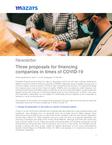
Three proposals for financing companies in times of COVID-19
President Duque's announcement on April 9, according to which he will issue a decree enabling the State to finance for three months the payrolls of MSMEs, especially those of people earning up to 5 minimum wages, comes as a balm in times of high uncertainty and confusion. It is essential to adopt this measure since, due to their financial fragility, MSMEs are not subject to credit. However, this benefit should also be extended to other companies, since even small and medium-sized companies, despite having had revenues in 2019 that classify them as such (Decree 957 of 2019), have seen their operations suspended, are not eligible for credit today and are helpless at the crossroads of whether or not to survive this storm.
The purpose of this article is to analyze three proposals that may help the Government to raise the necessary resources to finance companies in times of Covid-19.
1. Change the destination of the surtax on income of financial entities:
Those of us who at the time criticized and constitutionally demanded this surtax (banking sector and academia), have desisted from our demands since we consider that the State requires these resources to finance itself at such a critical time as this. However, both the Law and the Regulatory Decree 456 of March 21, 2020, establish that such surtax will have, as a specific destination, the financing of highways and roads of the Tertiary Road Network. Although at the time this could have been a priority, today it is not. Today the priority is the preservation of Colombian companies so that employment can be preserved, and the economy can survive. In this sense, the President should, through a decree with force of law, modify the specific destination of such surtax (calculated by Senator David Barguil at $700,000 million for 2020) and allocate it to finance the recovery of Colombian companies.
2. Tax on the highest salaries of public officials:
The President announced that, to finance this measure, a contribution will be made for 4 months, by the civil servants who earn the most money. Such contribution will be 10% of their remuneration (salary plus bonuses and other benefits) for those who earn between 10 and 15 million, and 15% for those who earn more than 15 million. This is undoubtedly a wise measure at this time, since today public officials are practically the only people whose income is guaranteed and, in this sense, it is up to them to show solidarity with the rest of the population in the reconstruction of the social fabric. The correct way to implement this measure is through the creation of a tax on the highest salaries and remunerations of the State (something that the President can perfectly do in the current state of emergency), since the implementation of voluntary or mandatory contributions, or worse - the donation - of salaries may lead to multiple discussions about the non-obligatory nature of these and to the filing of tutelage actions by public officials for the preservation of their "vital minimum".
3. Leverage with mandatory pensions:
Mandatory pensions are resources deposited by Colombian employees and employers with a view to the worker eventually being able to enjoy his or her pension. These resources can, within the framework of the economic emergency, be borrowed by the Government and guaranteed by sovereign public debt securities, thus guaranteeing a minimum yield that allows savers to keep (and increase) their pension savings.
According to Asofondos, as of December 2019, Colombia has $281.7 trillion pesos saved in mandatory pension funds. If the Government borrows part of these resources (and guarantees their capital and minimum yields with the issuance of public debt securities) to use them to save the national economy, it would not need to resort to more tax reforms or foreign indebtedness to reactivate Colombian industry. This would also give a respite to savers in the sense that they will have the certainty that their pension savings will not be diminished with eventual market fluctuations and are guaranteed by the State.


